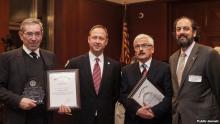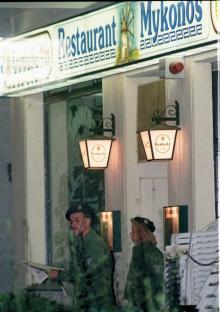Defenders of Justice Honored
The attorneys who prosecuted Iranian-backed assassins finally get their due.
 President Obama, in his meeting with French President Francois Hollande earlier this month, warned countries eager to boost trade with Iran that the U.S. will come down “like a ton of bricks” on any firms that breach sanctions. The French and Turks have already sent delegations to Tehran and the Germans are following. Next week in New York City, the Federal Bar Association will honor two German attorneys who diligently fought their government’s pressure to put trade before justice amid a high-profile terrorism prosecution.
President Obama, in his meeting with French President Francois Hollande earlier this month, warned countries eager to boost trade with Iran that the U.S. will come down “like a ton of bricks” on any firms that breach sanctions. The French and Turks have already sent delegations to Tehran and the Germans are following. Next week in New York City, the Federal Bar Association will honor two German attorneys who diligently fought their government’s pressure to put trade before justice amid a high-profile terrorism prosecution.
U.S. News Contributing Editor Harold Evans reports:
The murders in the restaurant were swift. Two big, bearded men, their coat collars up to their eyes, came out of the drizzly night and burst into a dimly lit private room at the back of the restaurant. The taller of the two stood over a party of eight at a corner table. He thrust a gloved hand into a bag slung over his shoulder. “You sons of whores,” he shouted, then fired 26 bullets in two bursts from the machine gun within the bag, killing four. The dignified senior figure who had been addressing the group died in his chair. To make sure, the second assassin pulled a handgun from his belt and fired three more bullets into his head. A minute later the two shooters and a third bearded man who had blocked the door were gone, driven off in a blue BMW that had been waiting outside, its engine idling.
But if justice has not caught up with all the plotters, the attorneys who led the investigation and won convictions achieved something more significant than even trial verdicts. They exposed the masterminds behind the Mykonos murders – the Iranian leadership in Tehran – and with that its then-unknown campaign to exterminate opponents no matter where they were in the world. Iran’s hit men had already killed more than 100 who had fled Iran. The victims at the restaurant were members of Iran’s Democratic Party of Kurdistan who were meeting with Secretary General Sadegh Sharafkandi.
Weeks before the Mykonos murders, the popular Iranian singer Fereydoun Farrokhzad was found beheaded in his home near Bonn, but nobody made the connection to a decree from Ayatollah Ruholla Khomeini upon winning power in 1979. He personally identified 500 individuals he wanted dead. Khomeini died in 1989 but his succcessor, the current Supreme Leader, Ayatollah Ali Khamenei, and his associates, continued to operate what President Reagan called Murder Incorporated (North Korea being another charter member; its human rights violations were documented just this week in a new United Nations report.)
At the time, Khamenei was head of the “Committee for Special Operations,” which authorized the Mykonos assassinations, along with President Hashemi Rafsanjani; Minister of Intelligence Ali Fallahian, known as the butcher for his appetite for summary executions; and Foreign Minister Ali Akbar Velayati. Two months after Mykonos, Khamenei doubled the reward for the murder of author Salman Rushdie. Shortly thereafter an opponent was killed in Istanbul, and the interior minister said opposition leaders had that and more coming to them. The same month European ministers met excitedly with Iran to boost trade between them. Iran’s cynical contempt for human rights did not abate with sweet words from the diplomats. That January a car bomb killed a critic in Ankara, and another was shot in Iraq and another in Rome.
Bruno Jost, the unassuming lead prosecutor of the trial of the Mykonos murderers, and his supportive boss, Alexander von Stahl Sr., a rising political star as Germany’s attorney general, achieved what they did at great personal cost. They called on their forensic skills, but even more on their resilience in the face of pressures from Germany’s political leadership, to avoid doing anything that would hazard Bonn’s role as champion of “moderate forces” in Iran and, not incidentally, profitable trade deals. Instead, they chose to risk their lives and careers by a dedication to a faith central to a civilized society, faith in the rule of law.
Their heroism will finally be honored, as it has not been in Germany, by the Federal Bar Association at a ceremony in New York City next week at the Daniel Patrick Moynihan U.S. Courthouse. The fiercely independent judge who presided over the trial of the assassins, Frithjof Kubsch, would no doubt have been honored with them. He presided over 246 sessions and heard 176 witnesses but died soon after its conclusion from leukemia. He had postponed treatment to see the trial to its end.
Much is owed to Roya Hakakian, the author of the riveting 2011 book, “Assassins of the Turquoise Palace.” At a meeting of the FBA in Hawaii last year, where she was a keynote speaker, Hakakian called Jost the modern day Atticus Finch, the hero of “To Kill a Mockingbird.” The lawyers and judges at the conclave were appalled when they heard of the treatment of Jost and von Stahl. Swiftly, with the backing of the president of the FBA’s Southern District of New York Chapter, William Dahill, members voted for the first time in their nearly 100-year history to present the Rule of Law Award to two foreigners. “It’s vital to remember this case,” Hakakian said recently, “especially now that [President Hassan] Rouhani seems to have the world convinced that all is well with Iran, while the number of executions has spiked since he took office.“
The integrity of Jost and von Stahl infuriated Tehran. Jost and his family lived in a state of perpetual siege from hit men, a watchtower on their home, bodyguards everywhere he went. They expected that. What shocked them was the unrelenting pressure from Germany’s political leadership to drop the case.
A month after the murders, the head of German intelligence, Bernd Schmidbauer, received a secret visit from a man minuted as “F.” It was Minister of Intelligence Fallahian, who expected that his demand for the trial to be aborted would be met. Look what Tehran had done for Germany getting a hostage released. He didn’t know that he’d had a lucky escape. Jost and von Stahl had made plans to arrest him, countermanded by the politicians. When word of the visit leaked, Schmidbauer continued to act as Bonn’s champion of Iran, blasting the idea that Tehran was the culprit. “Those who know the facts would draw vastly different conclusions,” said Schmidbauer.1
Opinions contained within the article is of the author and not necessarily representative of Iran Roundtable.
Iran Roundtable publishes these articles for the sole purpose of disseminating information to stimulate discourse and awareness and diversity of issues.

